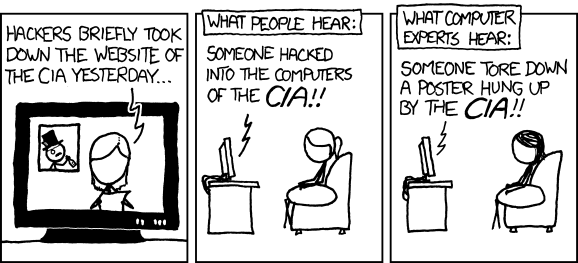Encryption Backdoors Will Always Turn Around And Bite You In The Ass
from the golden-keys dept
As you may have heard, the law enforcement and intelligence communities have been pushing strongly for backdoors in encryption. They talk about ridiculous things like "golden keys," pretending that it's somehow possible to create something that only the good guys can use. Many in the security community have been pointing out that this is flat-out impossible. The second you introduce a backdoor, there is no way to say that only "the good guys" can use it.As if to prove that, an old "golden key" from the 90s came back to bite a whole bunch of the internet this week... including the NSA. Some researchers discovered a problem which is being called FREAK for "Factoring RSA Export Keys." The background story is fairly involved and complex, but here's a short version (that leaves out a lot of details): back during the first "cryptowars" when Netscape was creating SSL (mainly to protect the early e-commerce market), the US still considered exporting strong crypto to be a crime. To deal with this, RSA offered "export grade encryption" that was deliberately weak (very, very weak) that could be used abroad. As security researcher Matthew Green explains, in order to deal with the fact that SSL-enabled websites had to deal with both strong crypto and weak "export grade" crypto, -- the "golden key" -- there was a system that would try to determine which type of encryption to use on each connection. If you were in the US, it should go to strong encryption. Outside the US? Downgrade to "export grade."
In theory, this became obsolete at the end of the first cryptowars when the US government backed down for the most part, and stronger crypto spread around the world. But, as Green notes, the system that did that old "negotiation" as to which crypto to use, known as "EXPORT ciphersuites" stuck around. Like zombies. We'll skip over a bunch of details to get to the point: the newly discovered hack involves abusing this fact to force many, many clients to accept "export grade" encryption, even if they didn't ask for it. And it appears that more than a third of websites out there (many coming from Akamai's content delivery network -- which many large organizations use) are vulnerable.
And that includes the NSA's own website. Seriously. Now, hacking the NSA's website isn't the same as hacking the NSA itself, but it still seems notable just for the irony of it all (obligatory xkcd):

There’s a much more important moral to this story.Let's repeat that last line, because it still seems that the powers that be don't get it:
The export-grade RSA ciphers are the remains of a 1980s-vintage effort to weaken cryptography so that intelligence agencies would be able to monitor. This was done badly. So badly, that while the policies were ultimately scrapped, they’re still hurting us today.
This might be academic if it was just a history lesson — but for the past several months, U.S. and European politicians have been publicly mooting the notion of a new set of cryptographic backdoors in systems we use today. This would involve deliberately weakening technology so that governments can intercept and read our conversations. While officials are carefully avoiding the term “back door” — or any suggestion of weakening our encryption systems — this is wishful thinking. Our systems are already so complex that even normal issues stress them to the breaking point. There's no room for new backdoors.
To be blunt about it, the moral of this story is pretty simple:Encryption backdoors will always turn around and bite you in the ass. They are never worth it.
Whether it's creating vulnerabilities that come back to undermine security on the internet decades later, or merely giving cover to foreign nations to undermine strong encryption, backdoors are a terrible idea which should be relegated to the dustbin of history.
Filed Under: backdoors, encryption, export encryption, export keys, freak, nsa, openssl, ssl, tls, vulnerability

